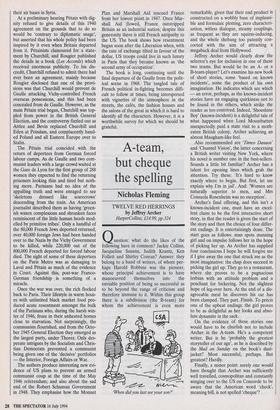A-team, • but cheque the spelling
Nicholas Fleming
TWELVE RED HERRINGS by Jeffrey Archer HamerCollins, £14.99, pp.324 Question: what do the likes of the following have in common? Jackie Collins, Jacqueline Susann, Judith Krantz, Ken Follett and Shirley Conran? Answer: they belong to a band of writers, of whom per- haps Harold Robbins was the pioneer, whose principal achievement is to have manoeuvred themselves into the enviable position of being so successful as to be beyond the range of criticism and therefore immune to it. Within this group there is a subdivision (the B-team) for whom the achievement is even more 'When did you last see your son?' remarkable, given that their end product is constructed on a wobbly base of implausi- ble and formulaic plotting, zero characteri- sation, witless dialogue, steamy couplings, as frequent as they are squirm-inducing, and the whole shebang too patently con- cocted with the aim of attracting a megabuck deal from Hollywood.
Jeffrey Archer would clearly draw the selector's eye for inclusion in one of these two teams. But would he be an A- or a B-team-player? Let's examine his new book of short stories, some 'based on known incidents', some the product of his own imagination. He indicates which are which — an error, perhaps, as the known-incident stories have an engaging quirkiness not to be found in the others, which strike the reader as too contrived. Indeed, 'Shoeshine Boy' (known-incident) is a delightful tale of what happened when Lord Mountbatten unexpectedly paid a state visit to a moth- eaten British colony, Archer achieving an almost Maugham-like feel.
Also recommended are 'Time° Danaos' and `Chunnel Vision', the latter concerning a British writer visiting New York, where his novel is number one in the best-sellers. Sounds a little bit familiar? Archer has a talent for opening lines which grab the attention. Try these: 'It's hard to know exactly where to begin. But first, let me explain why I'm in jail'. And: 'Women are naturally superior to men, and Mrs Consuela Rosenheim was no exception'.
Archer's final offering, and this isn't a known-incident one, must have an excel- lent claim to be the first interactive short story, in that the reader is given the start of the story and then the choice of four differ- ent endings. It is entertainingly done. The start goes as follows: man spots stunning girl and on impulse follows her in the hope of picking her up. As Archer has supplied four conclusions I hope he will forgive me if I give away the one that struck me as the most imaginative: the chap does succeed in picking the girl up. They go to a restaurant, where she proves to be a pugnacious lesbian with an attitude problem and a penchant for bickering. Not the slightest hope of leg-over here. At the end of a dis- agreeable meal he discovers his car has been clamped. They part. Finish. To précis one of the upbeat endings: the girl proves to be as delightful as her looks and abso- lute dynamite in the sack.
On the evidence of these stories one would have to be churlish not to include Archer in the A-team. He's a competent writer. But is he 'probably the greatest storyteller of our age', as he is described by the Mail on Sunday on the book's dust- jacket? Most successful, perhaps. But greatest? Hardly.
Finally, a minor point: surely one would have thought that Archer was sufficiently well travelled, cosmopolitan and constantly winging over to the US on Concorde to be aware that the American word 'check', meaning bill, is not spelled 'cheque'?


















































 Previous page
Previous page